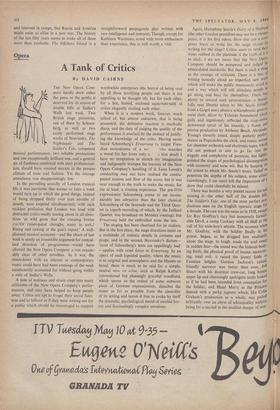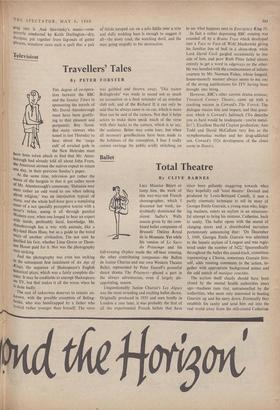Opera
A Tank of Critics
By DAVID CAIRNS In the prevailing anarchy of London musical life it was inevitable that sooner or later a week would turn up in which the good things, instead of being dropped thinly over lean months of dearth, were emptied simultaneously with such reckless profusion that London was loud with distracted critics madly tearing about in all direc- tions 'as wild geese that the creeping fowler eye/Or russet-pated choughs, many in sort,/ Rising and cawing at the gun's report.' A well- planned musical economy—and the chaos of last week is surely an irresistible argument for central- ised direction of programmes—would have allowed the New Opera Company a run reason- ably clear 6f other novelties. As it was, the ,music-lover with an interest in contemporary music could have had most evenings of the week satisfactorily accounted for without going within a mile of Sadler's Wells.
A note of testiness and strain crept into many criticisms of the New Opera Company's perfor- mances, and may have helped to keep people away. Critics are apt to forget their social 'func- tion and to behave as if they were writing not for a public which should be encouraged to support worthwhile enterprises (the horror of being read by all those terrifying people out there is too appalling to be thought of), but for each other, for a hot, humid, enclosed aquarium-tank of critics elegantly circling each other.
When it is a modern work, famous, much talked of, but almost unknown, that is being presented, the defensive reaction is markedly sharp, and the duty of judging the quality of the performance is overlaid by the instinct of justify- ing the knowledge of the critic. Having never heard Schoenberg's Erwartung (a turgid Freu- dian monodrama of a wo- -).-ho searches a wood for her lover only ii. .1 him dead) I have no temptation to stretch my imagination and indignantly trumpet the travesty of the New Opera Company's handling of it. Leon Lovett's conducting may not have realised the contra- puntal tension and flow of the score, but it was near enough to the truth to make the music, for me at least, a riveting experience. The pre-1914 expressionist Schoenberg seems to me incom- parably less attractive than the later classical Schoenberg of the Serenade and the Third Quar- tet (a superb recording of which, by the Juillard Quartet, was broadcast on Monday evening); but Erwartung held me enthralled none the less.
The staging has been chastised for its realism. But in the first place, the stage directions insist on a multitude of realistic details in costume and props; and in the second, Stravinsky's dictum— 'most of Schoenberg's texts are appallingly bad' —applies with cruel force to Erwartung. In an opera of such lopsided quality, where the music is so original and atmospheric and the libretto so banal, there is much to be said for a simple, neutral mise en scene, such as Ralph Koltai's conventional but pleasingly graceful woodland, which spares us the ordeal of some outworn piece of German expressionism, detaches the music as far as possible from the absurdity of its setting and leaves it free to evoke by itself the dramatic, psychological mood of morbid hor- ror and fascinatingly complex emotions. Again, Humphrey Searle's Diary of a Madnun (the other London premiere) may not be a master- piece; it is his first opera. How else can a con poser learn to write for the stage except tY writing for the stage? Critics seem to need the r noses rubbed in the platitude if the truth of it is to stick. I do not mean that the New Opera Company should be pampered and judged .tY emasculated standards. But there is such a thing as the strategy of criticism. There is a waY ti writing honestly about an imperfect new wotk which will make the public strenuously avoid It. and a way which will still stimulate people in go along and hear for themselves. There Wi s plenty to reward such perseverance—a beaut• fully neat libretto taken by Mr. Searle himse f from a Gogol story about a schizophrenic goverl • ment clerk, ddcor by Yolanda Sonnabend wim-11 gaily and ingeniously reflected the tragi-enm downward spiral of his insanity, a fluent and precise production by Anthony Besch, Alexandt r Young's cleverly timed, deeply pathetic Pe& mance as Popristchin the clerk, and music, scored for chamber orchestra and electronic tapes, which did not pretend or aim to go far into the tragedy and complexity of paranoia, but lightlY pointed the stages of psychological disintegration with economy and terse wit. But by harping ° the extent to which Mr. Searle's music `failed '.1° penetrate the depths of his subject, some crittO (unwittingly, I am sure) left the impression of a show that could cheerfully be missed. There was besides a very potent reason for net missing it—the other half of the double bill, The Soldier's Tale, one of the most perfect Prn. ductions seen on the English operatic stage for a decade. The cast was the same as in 1958, excel t for Roy Godfrey's racy but immensely form!' ' able Devil, a camp Cockney with all Hell at the e call of his wide-boy's whistle. The moment wn° Mr. Godfrey, with the Soldier finally in his power, began, as he dragged him exultant Y about the stage, to laugh, made the soul sweat in sudden fear—the sound was the hideous bodY' ing forth, the physical proof of insane, unwaver- ing, total evil; it raised the jaunty fable In Faustian heights. Gordon Jackson's casa31' friendly narrator was better than ever, job Stuart with his doormat crew-cut, long honest upper lip and charmingly apologetic smile looka as if he had been intended from conception fie" the Soldier,* and Hazel Merry as the Prince s danced with a perky rapture which, like Coto Graham's production as a whole, was poised brilliantly over an abyss of whimsicality without being for a second in the smallest danger of steP- Ping into it. And Stravinsky's music—com- petently conducted by Keith Darlington—dry, deadpan, put together from fag-ends of gutter Phrases, somehow casts such a spell that a pair of thirds scraped out on a solo fiddle over a trite and dully nodding bass is enough to suggest it all—the dusty road, the watching devil, and the man going stupidly to his destruction.







































 Previous page
Previous page